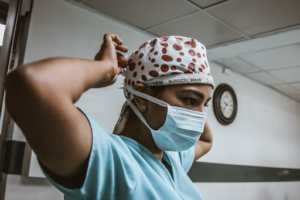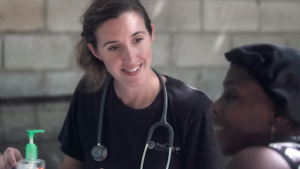Nurses are able to start work with only an associate’s degree and a license, but continuing to pursue higher education can lead to better work opportunities and higher job satisfaction.
There are many reasons why a nurse may decide to pursue a higher degree, whether this is simply their BSN or their master’s in nursing. As more and more healthcare organizations begin to require nurses to have a BSN, it’s becoming the standard degree. But few positions require an MSN and even fewer nurses are eager to continue their schooling when they don’t need to.
Pursuing a higher education is an important step in the career development process, but not everyone feels the need to get their master’s degree. That doesn’t mean it’s any less important, though.
Why pursuing higher education is a good idea
#1. Higher Salary
Nurses with only their RNs license earn around $71,000 annually while nurses with their BSN earn around $87,000 annually. When you earn your master’s in nursing, however, this number only increases as do your benefits.
Some nursing positions that require an MSN include nurse practitioners, nurse midwives, research nurses, and nurse educators. While some establishments may require as much as a DNP for these positions, many organizations will eagerly hire someone with only an MSN.
#2. More Job Opportunities
While many nursing jobs are fit for those with an BSN, there are even more jobs available to those who hold their master’s or even their doctorate. With your higher degree in hand, you’ll be more than qualified for most jobs and perfectly qualified for many more.
If you decide to not pursue a higher degree, you give up on your chance to pursue many other job opportunities. Fortunately, there are many BSN to MSN and even RN to MSN bridge programs that make earning your master’s easy no matter where you are in your education.
#3. Provide Better Patient Care
With a higher education, you’ll have more advanced knowledge and skills that you can use in order to provide even better patient care. During your studies, you’ll learn specialized skills that you may not have otherwise learned until much later.
With a better understanding of your own career field, you’ll be better equipped to help and soothe patients who may be undergoing stressful procedures or feeling scared about the future. Your expertise in patient care and medical procedures will be vital as you care for new and returning patients alike and with improved care practices, you’ll be able to help patients more than ever.
#4. Career Advancement

Many employers are willing to hire nurses even if they only have an undergraduate degree, but with a graduate degree, you’ll be able to take your career one step higher. You’ll be qualified for leadership roles, specialty care, and other advanced positions. Depending on where you want to focus your work, you may be able to land a job on the hospital board or as a nurse lobbyist.
If you’ve already spent a few years in the workforce, earning your MSN is a great way to advance your career in a meaningful way.
#5. Universally Accepted
While certifications may be helpful, they’ll often expire or may not be recognized by every organization. This can be frustrating for nurses who earned the certificate in order to qualify for a job within their current organization. As soon as you attempt to change jobs or your move to a different facility, this certification may not be enough.
With a master’s degree in nursing, you’ll be able to prove your expertise no matter where you go. Healthcare organizations all over the country will recognize your degree and the expertise that it gives you.
#6. More Autonomy
For many nurses, the thought of working under a physician isn’t terrible. In fact, it’s generally thought of as the rule, not the exception. While most nurses are fine working under the supervision or control of another physician, some nurses want careers with more autonomy.
Nurses that want more autonomy in their work should definitely look into a higher degree. There are certain jobs available that allow either a high level or or complete autonomy while working, but you will be expected to hold a higher level of education and certain licenses or certifications.
#7. Better Healthcare Decisions
As a nurse, you may be a key player in helping a patient decide what course of action is best for them. While you cannot force a patient to make a decision, you can help guide them by providing them with expert knowledge and insight into each possible outcome. Many times, you may be responsible for a patient’s care on your own and must make the best decision for them.
With a master’s in nursing, you’ll have expanded knowledge and experience that can help you make better, more sound healthcare decisions. Whether you’re helping a patient understand their potential treatment plans and guiding them to a decision, or you need to act on your own to save a patient, an advanced degree will give you the confidence and knowledge you’ll need.
#8. Fill a Need
Nurses with a higher education are in higher demand than ever. As older nurse educators retire and few replace them, nursing programs are seeing a decline in admissions. Other nursing roles such as advanced practice nurses are also seeing a growing shortage.
As these positions require higher education, only a few nurses are qualified to take them on. With an MSN in hand, you can be one of the few available to help fill the gap and train new nurses.
Become a better nurse

At the end of the day, higher education will help make you a better nurse. You’ll have unique knowledge and advanced skills that will help you make more informed decisions. You’ll have more confidence in your own skills, be more prepared for difficult situations, and help train and educate new nurses as they join the workforce. If you want to truly make a difference in the healthcare industry and improve patients’ lives, earning a higher degree is the way to go.




